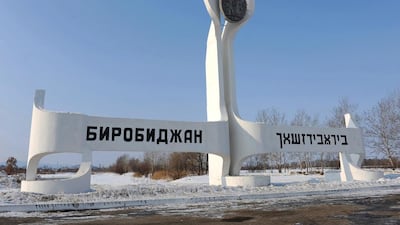Former Mossad chief Tamir Pardo was never employed to rush to conclusions. In his first public remarks since stepping down from the head of the Israeli intelligence agency last month, Mr Pardo delivered a sober but not surprising assessment of the strategic threats he sees in the region. “The internal threat must worry us more than the external threat,” he said.
Citing divisions in Israeli society, he said that the risk of civil war was a greater concern than regional foes. Strikingly he didn’t blame a single group or person for the division. Rather, he noted: “There are some for whom it’s comfortable to emphasise that which divides and not that which unites. I can’t put my finger on a group or leader. It exists within all the country’s groups.”
Mr Pardo’s remarks echo other senior Israeli politicians who see the country’s internal cohesion breaking down. This strife shouldn’t come as a surprise. For one, there is no generally accepted way of determining who is and who is not Jewish in Israel. The government allows Jews who would have been prosecuted under the Nazi Nuremberg laws (anyone with one Jewish grandparent) to acquire automatic Israeli citizenship.
The ultraorthodox, however, adhere to a rabbinic version of Jewishness. Only a person born to a Jewish mother is considered Jewish in their eyes. This is critical for Israeli society given that the orthodox have control over personal status issues such as marriage and divorce. Thus, Russian immigrants who are able to acquire citizenship and fight in the army are not allowed to be married inside Israel because the state only allows orthodox marriage.
One way that Israel has been able to create cohesion in the face of these glaring internal differences is through outside enemies and the use of violence. The Palestinians, in particular, have served as the ultimate scapegoat for the lack of internal identity. The ever-present outside enemy serves as an important unifying force that is refined through mandatory military service. Without an enemy, Israelis could very well turn on each other, as the former Mossad chief acknowledged.
Just as Mr Pardo delivered his solemn remarks on the breakdown of Israeli society, a new book by the Russian-American journalist Masha Gessen about another failed experiment in Jewish autonomy was published. The volume tells the story of the city of Birobidzhan, in Russia’s far east near the Chinese border.
In the 1920s, the largely uninhabited region was designated by the Soviet government as one of the first Jewish autonomous regions in the modern era. Jewish people from around Russia and further afield, including Los Angeles and Buenos Aires, flocked to Birobidzhan despite the obvious complications of moving to a remote area full of Cossacks, ethnic Chinese and Koreans.
While the Israeli government pushes a narrative that Zionism was the only natural development for Jews in Europe and one that was generally welcomed by global Jewry, history reveals a much different story. Many European Jews rejected Zionism, arguing that they were fine in Europe and had no reason to move to Palestine. The high numbers of Jews killed by Hitler are proof that Zionism’s push to colonise Palestine was never massively popular in Europe before.
For Yiddish-speaking Jewish communities in the late 19th and early 20th centuries, achieving autonomy that would facilitate a sense of safety was the priority. For this community that had rejected Zionism, Birobidzhan was a critical but ultimately flawed attempt at autonomy.
Some Jewish thinkers argued that the creation of a state, as the Zionists envisioned, would be counter productive in the long term because the Jews had achieved a post-nationalism community. The communities of the late 19th and early 20th centuries maintained a form of cohesion without having to be burdened with state apparatuses such as a military or municipality duties such as rubbish collection. The only problem was safety from persecution and these thinkers argued that could be achieved through autonomy.
Birobidzhan is an often forgotten attempt at this autonomy. In the 1920s, the Soviet Union was busy dividing up Russia’s ethnic groups into “national” groups and giving some of them autonomous regions within the Soviet empire.
The Soviets were bitterly opposed to Zionism and, looking for a way to bring millions of Russian Jews out of poverty, decided on the creation of a Jewish autonomous zone in the country’s wild far eastern reaches. Yiddish leftists embraced the idea and were smitten with the allure of a place where they could praise both Marx and notable characters of Yiddish culture.
Ultimately, Stalin’s purges destroyed Birobidzhan. The Yiddish leftists were considered traitors and the idea of Jewish autonomy in the Soviet Union was considered itself seditious. As Gessen notes in her engaging book, the Birobidzhan saga today is little more than a bad joke among the remnants of the Russian Jewish community.
Russia's brief experiment in Birobidzhan is confirmation that the state of Israel and the Zionist ideology that enables it is just one of many attempts at solving the question of Jewish autonomy. While Zionism has lasted until today, it has done so through the use of violence and the dispossession of the Arab inhabitants of Palestine.
Perhaps the only way that the state will defend itself from internal strife and possible civil war, as Tamir Pardo has warned, will be through the continuing application of violence and an ever present enemy.
Birobidzhan was destroyed by Soviet anti-semitism and not a breakdown in cohesion of its residents. Israel, on the other hand, could succumb to the fatigue of colonialism and the weakness of its founding ideals.
Israel’s narrative convinces the world and itself that it is the only expression of Jewish sovereignty. In fact, it is only the most violent manifestation among other attempts.
jdana@thenational.ae
On Twitter: @ibnezra

